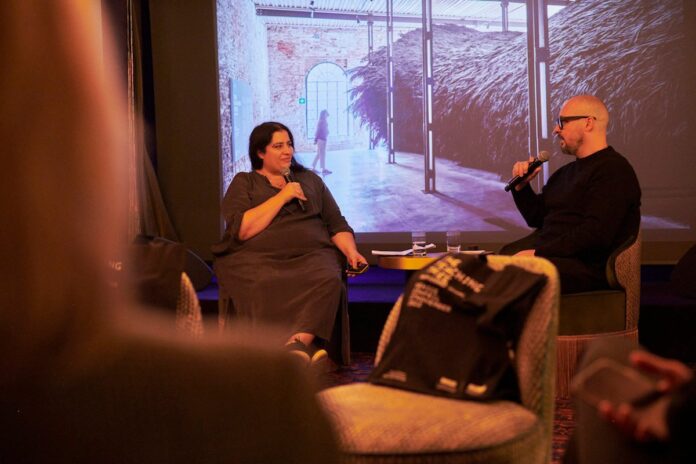LONDON: Muhannad Shono, one of the Kingdom’s leading contemporary artists, gave an insight into his life and work this week during a live discussion in London, alongside curator and art historian Reem Fadda.
The event was held on Monday at The Arts Club in Mayfair — a private members’ club founded in 1863 as a place for creatives to meet and exchange ideas. It came ahead of the Frieze London show, where work by Shono and other artists will be displayed in Jeddah’s Athr Gallery until Sunday.
“The Teaching Tree” (2022) created for the Saudi Pavilion at the 59th Venice Biennale. (Supplied)
The discussion began with a look at “The Teaching Tree,” the artwork Shono created for the Saudi Pavilion at the 59th International Art Exhibition Venice Biennale, which opened in April and runs until next month.
The installation is a 40-meter-long structure covered in dried and painted palm fronds and animated by pneumatics. Its ambiguous form pierces the length of the space and intermittently expands and contracts as if breathing.
The artist’s work has been influenced by the stories of Al-Khidr, a legendary Islamic figure made of plant matter. It was believed that wherever Al-Khidr sat a garden would grow, symbolizing rebirth, regeneration and healing.
The charcoaled leaves of “The Teaching Tree” also signal rebirth, like a phoenix rising from the ashes.
Shono said his art was often an investigation of the drawn line and its potential for creation and destruction.
“The work begins with a single line and from that it duplicates and grows and manifests into something that refused to be silenced with a single line back in the beginning,” he said.
“Streams, Dreams and Flow States” (2019) at the Khuzam Palace in Jeddah. (Supplied)
This idea was evident in his 2019 work “Streams, Dreams and Flow States,” which consists of 3,000 black PVC pipes and was built at the long-abandoned Khuzam Palace in Jeddah, where the first oil exploration agreement between Saudi Arabia and the US was signed in 1933.
“The pipe in itself, much like the line of ink on paper, in its singularity is dismissed,” Shono said.
“Oil wields power but a single pipe is insignificant. But through intention, wielding them in number and motion it becomes something undeniable.”
His repeated use of black is also deliberate, depicting the void left where images are redacted. However, rather than suppressing creativity, Shono said the void highlighted our attention to it and thus accelerated the imagination.
The Riyadh-based artist said he was drawn to creating work that disrupted everyday living in order to shift the mind into a different mode of thought. In this sense, the human response is integral to his work.
“The Lost Path” (2020) created for Desert X Al-Ula in Saudi Arabia. (Supplied)
Talking about “The Lost Path,” a sculptural path made of 65,000 PVC pipes created in 2020 for Desert X Al-Ula in Saudi Arabia, Shono said he wondered whether viewers would observe the work from afar or follow its course across the desert.
With his creations on show in museums around the world, Shono said he felt like he was representing his country in the midst of change.
“I think it’s an extremely exciting time. I never thought we would be experiencing this kind of transition now and this idea of people leaving (Saudi Arabia) but choosing to come back to express is intoxicating.”
He recently opened a multidisciplinary studio and residency in Riyadh, where artists can collaborate and exchange ideas.

